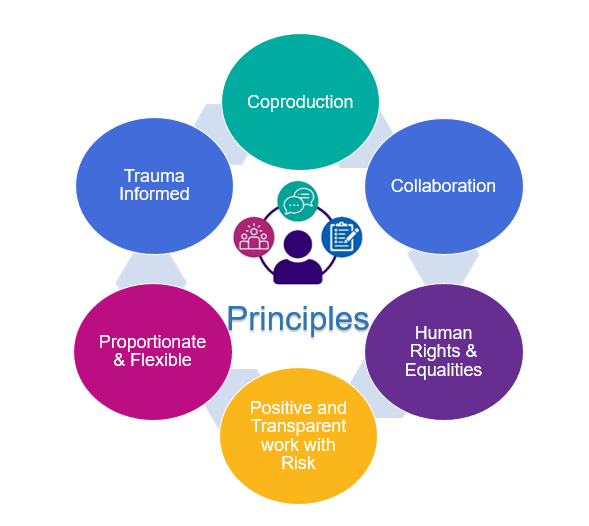Your Team, Your Conversation, Your Plan
From 2024, we are adopting a new more personalised and system-based approach to care planning called Your Team, Your Conversation, Your Plan.
This new approach is aimed at enhancing the quality of care and outcomes for people.
In 2021, NHS England published a position statement that required Mental Health Systems to use an approach to care and support planning that is flexible, personalised, integrated and focuses on the delivery of meaningful interventions.
Your Team, Your Conversation, Your Plan, was co-produced by lived experience representatives and system partners including voluntary and community sector enterprises (VCSEs), the third sector, local authorities, primary care, and Avon and Wiltshire Mental Health Partnership NHS Trust.

Co-production: We will adopt a ‘nothing about you without you’ approach, with all care plans being produced by both the person and staff – based on discussions about what matters to a person.
Collaboration: We will use a ‘team around the person’ approach, working closely together with friends, family, carers, and partner organisations.
Human rights and equalities: We will be clear about the use of legal frameworks and people’s rights in Personal Wellbeing Plans and will focus on equality of service delivery.
Working transparently and positively with risk: We will work openly and positively with safety, and we will use a shared approach to safety planning within Support Conversations.
Proportionate and flexible: We will use a simple, flexible, proportionate approach that is efficient, encourages creativity, and helps us provide more meaningful interventions.
Trauma informed: Our approach will be informed by an understanding that trauma is at the root of many people’s difficulties. We will recognise the person’s strengths and build on these to empower them with new skills, strengths and ways of coping.

We will understand, help to develop, and be part of the team around the person. With the person at the centre, we will work in close partnership with key people in their social network and staff from other organisations, and assist the person to achieve outcomes important to them. We will also build a trusting relationship with the person to enable co-production to take place.


We will have Support Conversations with the person and those important to them to collaboratively work out what might be helpful in their situation and understand outcomes they want to achieve, strengths and resources they have to achieve these outcomes, and support that might be available.
We will also try to take DIALOG measures throughout the Support Conversations to track progress. More information on this is here.


We will develop and update a Personal Wellbeing Plan (PWP) during Support Conversations with the person. This one plan will give a clear simple outline of what is happening, what support is being provided and what everyone is trying to achieve. Only users with access to the mental health electronic patient record (we currently use Rio EPR) are able to update the PWP. The PWP is designed to be flexible and personalised and the Support Conversation is the mechanism for the PWP to be continually amended through co-production. There is only one active version of the plan and it is the working tool to guide interventions.
This PWP will always be shared with the person. The PWP will be produced in a clear print format and should be adapted for each individual in line with the Accessible Information Standard. The PWP will also be shared with the wider system via the Shared Care Record i.e. Connecting Care and the BSW ICR Viewer.
NHS England » Accessible Information Standard.

The Quality Pillars are based on the based on the ‘My team around me’ approach originally designed by ‘Changing Futures’ in BNSSG.

We are focussed on delivering compassionate meaningful, intervention based care which has been planned between the person and their team. These interventions will be evidence-based and therapeutic and can be delivered by a range of organisations. There will be a focus on improving access to community resources.
The Keyworker
All people will have a Keyworker who will be allocated once interventions have been agreed. The person will help to decide who their keyworker is.
Keyworkers have the important function of facilitating communication, creating continuity of care and being the key point of contact for people and their families. They will have a good relationship with the person and the team, and take a lead role in making sure that the PWP makes sense, is up-to-date and is not overlong or complicated. However, all staff providing interventions also have a responsibility for having support conversations and updating the Personal Wellbeing Plan.
The Keyworker can work for any organisation that is involved in the delivery of integrated mental health support if the staff member has access to the electronic patient record (Rio EPR).
As part of this change, we have amended our approach to Consent to Share. We will have regular conversations with people to understand their wishes about sharing information. We recognise that there will be some aspects of life, care and treatment that people are willing to share and others that they are not.
People (and friends, family or carers where appropriate) should be given a leaflet explaining our approach to Information Sharing and Consent. The person’s wishes will be recorded in the Personal Wellbeing Plan and the most recent version of the plan will always be shared with the person so they can speak to staff if they wish to make a change.
We will record the person’s views about sharing information with relevant organisations, but also recognise that we routinely share information when working in partnership to provide direct health and social care. If there is a risk of harm, a legal or a safeguarding issue, we are obliged to share certain information.











